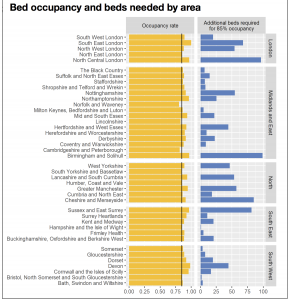Despite warm words about ‘parity of esteem’ for mental and physical health since 2011, mental health services are the poor relation of the NHS, comprising 23% of NHS activity, but receiving just 11% of its budget.
A new report commissioned by the Royal College of Psychiatrists, Exploring Mental Health Inpatient Capacity, attempts to work forward from the current serious shortages of beds and unacceptable numbers of patients dispatched often long distances for “out of area treatment” (OATs).
The starting point for this study is the disparity in resources and treatment for mental health patients, for whom inpatient beds for those who need them have been cut by 73% since 1987 (from around 67,100 to 18,400) while numbers of “general and acute” beds have fallen by 44%.
While average length of stay in acute hospitals has fallen rapidly, the average length of stay for mental health remains largely unchanged over 30 years, at 7 weeks.
Raised threshhold, reduced admissions
The reduction in number of beds available in mental health services has been managed “largely through a reduction in the number of people admitted to hospital, and in some regions by the use of out of area placements.
“The thresholds for admission to a mental health bed have increased; the level of mental ill health of people admitted to hospital in 2018 was higher on average than individuals admitted in 2013.
“Furthermore, patients discharged in 2018, although deemed clinically fit for discharge, were on average less well than patients leaving hospital in 2013.”
The RCP explains their approach:
“We commissioned this analysis to support our ambition that a psychiatric bed is readily and locally available for anyone who is acutely ill and in need of inpatient care.
“It is unacceptable for anyone under these circumstances to experience a lengthy stay in the emergency department, to be sent away from their local area to receive the care they need, or to be admitted to a general and acute bed where there is a relative lack of dedicated mental health nursing and psychiatric expertise.
“It is also a matter of equality. It would never be deemed acceptable for someone requiring acute coronary care to be admitted to a psychiatric ward.”

Extra 1,060 beds
The report calls overall for an increase of 1,060 acute mental health beds, but notes that the problems of capacity are not evenly distributed and there are more severe problems in a few areas with the highest level of inappropriate out of area placement over the past two years:
λ Bristol, North Somerset and South Gloucestershire; λ Devon; λ Hampshire and the Isle of Wight;
λ Lancashire and South Cumbria; λ Lincolnshire; λ Norfolk and Waveney and λ Nottinghamshire.
However the College also argued that those areas with persistent 95 per cent plus bed occupancy should also consider investing in additional local psychiatric beds, notably: λ Birmingham and Solihull; λCornwall; λ Mid and South Essex; λ North Central London; λ South East London and
λ Sussex and East Surrey.
Review
In addition the College is pressing for a wide-ranging review of the mix of services provided and their effectiveness, to “maximise the therapeutic value of inpatient stays and undertake a local service capacity assessment”, and urging commissioners to invest in high quality community mental health services.
But the bold call to reverse the continuing decline in bed numbers, with colourful graphics to highlight the numbers of additional beds requires to bring occupancy down to 85% and eliminate OATs will grab most attention.
While recent government announcements have reinforced feelings that mental health is treated as a poor relation of acute hospital care, this argues a strong case for more funding – explaining just where it needs to be spent.
Dear Reader,
If you like our content please support our campaigning journalism to protect health care for all.
Our goal is to inform people, hold our politicians to account and help to build change through evidence based ideas.
Everyone should have access to comprehensive healthcare, but our NHS needs support. You can help us to continue to counter bad policy, battle neglect of the NHS and correct dangerous mis-infomation.
Supporters of the NHS are crucial in sustaining our health service and with your help we will be able to engage more people in securing its future.
Please donate to help support our campaigning NHS research and journalism.


